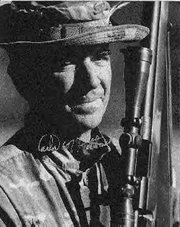Carlos Hathcock
|
|
Carlos Norman Hathcock II (May 20, 1942–February 23, 1999) was a Marine sniper during the Vietnam War. No Marine sniper was more effective than Carlos Hathcock at killing North Vietnamese and Viet Cong forces. He achieved 93 confirmed kills, but his actual total is believed to be well over 100. As a testament to his effectiveness, North Vietnam once put a bounty of $30,000 on his head. This was far more than the average $50-$100 bounty put on the heads of other U.S. snipers.
The Viet Cong knew him as well and called him Long Trang, "the white feather," because he often wore one in his bush hat. Hathcock remains a legend in the Marines. The Carlos Hathcock Award is presented annually to the Marine who does the most to promote marksmanship. There is also a sniper range named for Hathcock at Camp Lejeune, North Carolina.
Before his deployment to Vietnam he won many shooting championships, including the prestigious Wimbledon cup—long-range shooting's most prestigious prize – in 1965. A year later he was sent to Vietnam.
He once said that he survived in his work because of an ability to "get in the bubble," to put himself into a state of "utter, complete, absolute concentration," first on his equipment, then on his environment in which every breeze and every leaf meant something, and finally on his quarry.
His work demanded steady nerves and was exhausting. During one pursuit of an enemy general, he had to cover more than 1,000 meters of open terrain during three days and nights of constant crawling an inch at a time. Enemy patrols came within 20 feet of Hathcock, who lay camouflaged with grass and vegetation in the open.
Late in his life, he was awarded a Silver Star, the third-highest military honor, for an incident that occurred nearly 30 years earlier. Hathcock's career as a sniper came to a sudden end outside Khe Sanh in 1969, when the amphibious tractor he was riding on was ambushed and hit a 500-pound box mine. Hathcock pulled seven marines off the flame-engulfed vehicle before jumping to safety. As was his way, he rejected any commendation for his bravery.
He came out of the attack with second- and third-degree burns over more than 40% of his body and was evacuated to Brooke Army Medical Center in Texas, where he underwent 13 skin graft operations. The nature of the injuries left him unable to perform effectively again with a rifle.
After returning to active duty, he helped establish a scout and sniper school at the Marine base in Quantico, Virginia.
In 1975, Hathcock's health deteriorated and he was diagnosed with multiple sclerosis, an incurable degenerative nerve disorder. He stayed in the Corps but continued to decline in health and was forced to retire just 55 days short of the 20 years that would have made him eligible for full retirement pay.
M25.jpeg
Hathcock held the record for the longest combat kill with a 0.50 caliber BMG mounting a telescopic sight. The distance was an astounding 2250 meters. Hathcock was one of several individuals to utilize the Browning 0.50 caliber heavy machine gun in the sniping role. This success has led to the adoption of the .50 caliber cartridge as a viable anti-personnel and anti-equipment sniper round.
The record stood until 2002, when it was broken during Operation Anaconda when a Canadian three-man sniper team from the Princess Patricia's Canadian Light Infantry, (PPCLI), set the new record with a shot of 2,400 meters on a Taliban fighter.
After the war, a friend showed Hathcock a passage written by Ernest Hemingway: "Certainly there is no hunting like the hunting of man, and those who have hunted armed men long enough and like it, never really care for anything else thereafter."
Hathcock copied Hemingway's words on a piece of paper. "He got that right," Hathcock said. "It was the hunt, not the killing."
Carlos Hathcock was born in Little Rock, Arkansas on May 20 1942 and died on February 23, 1999 in Virginia Beach, Virginia after a long fight with multiple sclerosis.
He is the subject of two biographies, Marine Sniper and Silent Warrior.sl:Carlos Norman Hathcock

